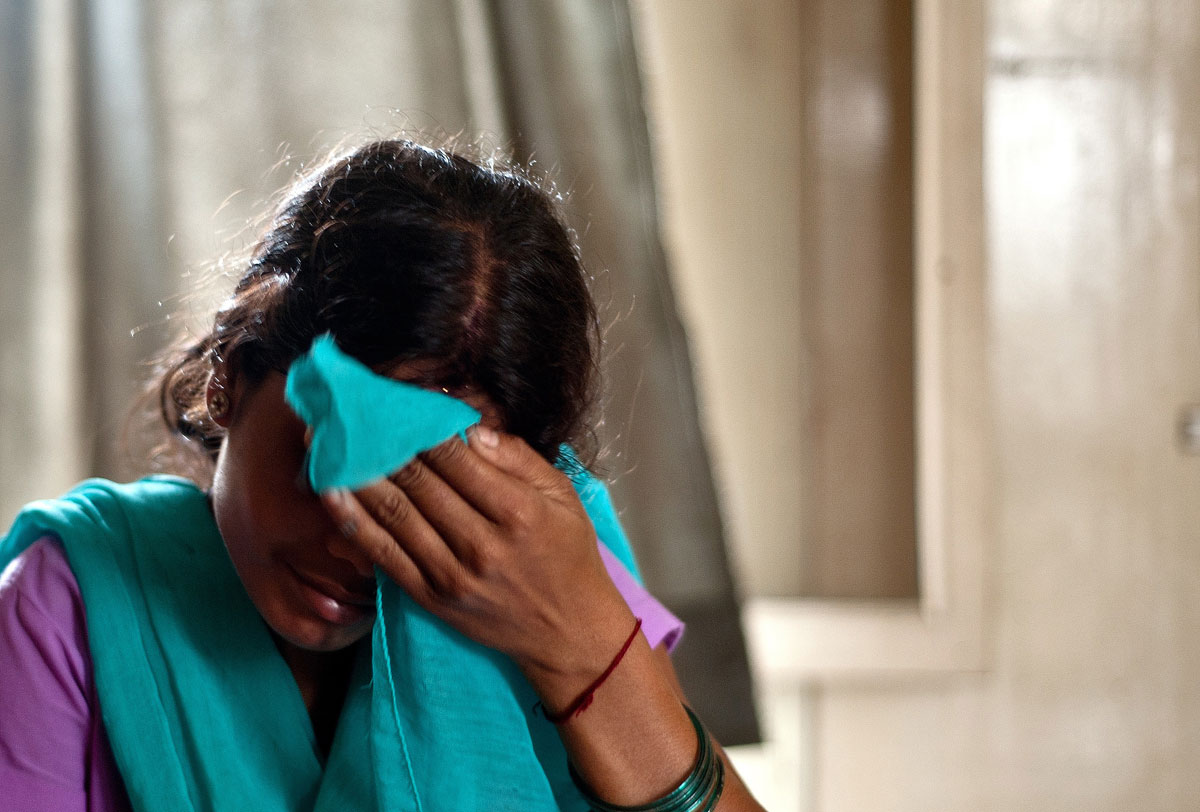Indian Police Officer Gets Prestigious Award in U.S.
In this photograph taken on Sept. 16, 2013, an alleged Indian human-trafficking victim sits at a police station after being rescued from a village in Karnal around 100 kms from New Delhi. In India, mostly women are trafficked or tricked into different forms of slavery ranging from domestic service to prostitution. Desperately poor parents also sell their children who are then forced into begging rackets and manual labor, according to other experts. (Manan Vatsyayana/AFP/Getty Images)
A senior Indian police officer has been given a prestigious award in the U.S. in recognition of his tireless efforts in fight against human trafficking. The U.S. continues to place India in tier-2 of its annual report on human trafficking, arguing that the country does not fully meet the minimum standards for the elimination of trafficking, writes Lalit K. Jha.
Mahesh Muralidhar Bhagwat has been recognized with the prestigious Trafficking in Persons (TIP) Hero award.
Bhagwat, who currently serves as Commissioner of Police of Rachakonda in Telangana, was presented the award in absentia by the U.S. First Lady Melania Trump, June 27.
He has participated in anti-trafficking operations that have removed hundreds of victims from situations of trafficking and, with the help of other government departments and civil society organizations, has ensured their placement in support programs, the State Department said.
“We are sorry that Bhagwat was unable to join us today, but would like to recognize him for his dynamic leadership in combatting modern slavery in India, his vital role in elevating human trafficking as a government priority, and his innovative approach to investigating cases and dismantling trafficking operations,” said Susan Coppedge, the Ambassador-at-Large for the Office to Monitor and Combat Trafficking in Persons at the award ceremony.
The First Lady and the Secretary of State Rex Tillerson were present at the awards ceremony held at the Foggy Bottom headquarters of the State Department.
In all eight persons from across the world were presented with this prestigious annual award of the US.
In his remarks, Tillerson said the State Department’s 2017 Trafficking in Persons Report exposes human trafficking networks and holds their operators and their accomplices accountable.
The focus of this year’s report is governments’ responsibilities under the Palermo Protocol to criminalize human trafficking in all its forms and to prosecute offenders, he said.
“We urge the 17 countries that are not a party to the international Protocol to Prevent, Suppress, and Punish Trafficking in Persons to reconsider their position and to join the other countries who have made that commitment,” Tillerson said.
Today, globally, it’s estimated that there are 20 million victims of human trafficking.
“So, clearly, we have a lot of work to do and governments around the world have a lot of work to do,” he said.
In her remarks, the First Lady said human trafficking is a pervasive human rights issue affecting millions, no matter their gender, age, or nationality.
It is often a profoundly secret crime.
“One of the greatest challenges is to merely identify those trapped in modern slavery. Even conservative estimates conclude that some 20 million people around the world, including right here in the United States, are trapped in human trafficking situations, terrible circumstances of exploitation, including so many young girls and boys who are victims of unthinkable tragedy of child sex trafficking,” Melania said.
U.S. Continues to Put India in Tier-2 in Report on Trafficking
India does not fully meet the minimum standards for the elimination of trafficking, the State Department said in its annual Congressional-mandated report on human trafficking but acknowledged that it has been making significant efforts to do so.
“The government demonstrated increasing efforts compared to the previous reporting period; therefore, India remained on tier-2,” the report said.
India’s efforts were reflected in increasing the number of victims identified, investigations completed, and traffickers convicted, as well as its budget for shelter programs for female and child trafficking victims.
It also adopted an action plan for children, which included plans to prevent child trafficking and protect child victims, the report said.
However, the government did not meet the minimum standards in several key areas, it rued.
“Overall victim identification and protection remained inadequate and inconsistent and the government sometimes penalized victims through arrests for crimes committed as a result of being subjected to human trafficking,” the report said.
According to the report, demonetization had an impact on sex trafficking last year. Some NGOs commented sex trafficking was temporarily reduced until other forms of payment were established some NGOs reported a resultant increase in other methods of payment including online payments, the report said.
Other NGOs stated workers in the informal economy, including brick kiln workers, were at times paid in void currency notes or were not paid at all due to cash shortages both situations subsequently increased the workers’ vulnerability to debt bondage and forced labor, it said.
India, the report said, is a source, destination, and transit country for men, women, and children subjected to forced labor and sex trafficking.
Forced labor constitutes India’s largest trafficking problem; men, women, and children in debt bondage sometimes inherited from previous generations are forced to work in brick kilns, rice mills, agriculture, and embroidery factories, it said.
“Most of India’s trafficking problem is internal, and those from the most disadvantaged social strata lowest caste Dalits, members of tribal communities, religious minorities, and women and girls from excluded groups are most vulnerable, the report said.
Within India, some are subjected to forced labor in sectors such as construction, steel, and textile industries, wire manufacturing for underground cables, biscuit factories, pickling, floriculture, fish farms, and ship breaking, the report said.
“Thousands of unregulated work placement agencies reportedly lure adults and children under false promises of employment into sex trafficking or forced labor, including domestic servitude, it added.


